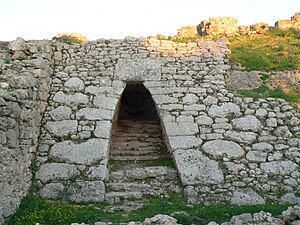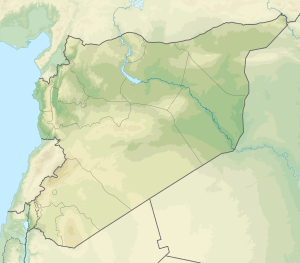Ugarit
Ugarit (/juːˈɡɑːrɪt, uː-/;[1] Ugaritic: 𐎜𐎂𐎗𐎚, ʼUgart; Arabic: أُوغَارِيت Ūġārīt or أُوجَارِيت Ūǧārīt) was an ancient port city in northern Syria. It is in the outskirts of modern Latakia. It was discovered by accident in 1928 together with the Ugaritic texts.[2] Its ruins are often called Ras Shamra[3] due to the headland on which they are found.
 Entrance to the Royal Palace of Ugarit | |
| Alternate name | Ras Shamra (Arabic: رأس شمرة) |
|---|---|
| Location | Latakia Governorate, Syria |
| Region | Fertile Crescent |
| Coordinates | 35°36′07″N 35°46′55″E / 35.602°N 35.782°E |
| Type | settlement |
| History | |
| Founded | c. 6000 BCE |
| Abandoned | c. 1190 BCE |
| Periods | Neolithic–Late Bronze Age |
| Cultures | Canaanite |
| Events | Bronze Age collapse |
| Site notes | |
| Excavation dates | 1928–present |
| Archaeologists | Claude F. A. Schaeffer |
| Condition | ruins |
| Ownership | Public |
| Public access | Yes |
Ugarit had close connections to the Hittite Empire. It also sent tribute to Egypt at times and maintained trade and diplomatic connections with Cyprus (then called Alashiya).[4][5] This is documented in the archives recovered from the site. It is confirmed by Mycenaean and Cypriot pottery found there. The polity was at its height from c. 1450 BCE until its destruction in c. 1200 BCE. This destruction was possibly caused by the mysterious Sea Peoples or internal struggle. The kingdom would be one of the many that fell apart during the Bronze Age Collapse.
References
change- ↑ "Ugarit". Merriam-Webster Dictionary.
- ↑ Huehnergard, John (2012). An Introduction to Ugaritic. Hendrickson Publishers. ISBN 978-1-59856-820-2.
- ↑ Sometimes written "Ras Shamrah"; Arabic: رأس شمرة, literally "Cape Fennel"). See [1].
- ↑ Whittaker, Helène; Hofsten, Helène Whittaker von (1997). Mycenaean Cult Buildings: A Study of Their Architecture and Function in the Context of the Aegean and the Eastern Mediterranean. Norwegian Institute at Athens. ISBN 9788291626031.
- ↑ "Searching for the Lost City of Copper". History Magazine. 2017-03-23. Retrieved 2021-01-15.

